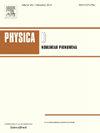Data assimilation and local-in-time global control of inviscid systems using partially resolved measurements
IF 2.9
3区 数学
Q1 MATHEMATICS, APPLIED
引用次数: 0
Abstract
Most data assimilation algorithms have focused on dissipative systems, as the method relies on the existence of a global attractor. In this paper, we extend the framework of continuous data assimilation to inviscid models. As a first step towards this goal, we consider two inviscid systems: the passive scalar transport equation and the Euler equation. The data assimilation algorithm we employ utilizes nudging, a method based on a Newtonian relaxation scheme motivated by feedback control. We consider the two systems in an analytic space with a time-dependent analytic radius. This allows us to extract an artificial dissipative term, which is necessary for the application of data assimilation techniques. We establish exponential decay of the error between the data assimilated solution and the reference solution on a finite time interval , and estimate the error at the end of the algorithm (as ).
采用部分分辨测量的无粘系统的数据同化和局部实时全局控制
大多数数据同化算法都集中在耗散系统上,因为该方法依赖于全局吸引子的存在。本文将连续数据同化的框架推广到无粘模型。作为实现这一目标的第一步,我们考虑两个非粘系统:被动标量输运方程和欧拉方程。我们采用的数据同化算法采用轻推,这是一种基于反馈控制驱动的牛顿松弛方案的方法。我们考虑两个系统在解析空间中具有随时间变化的解析半径。这允许我们提取一个人工耗散项,这对于数据同化技术的应用是必要的。我们在有限时间区间[0,T∗)上建立了数据同化解与参考解之间误差的指数衰减,并在算法结束时估计误差(如T→T∗)。
本文章由计算机程序翻译,如有差异,请以英文原文为准。
求助全文
约1分钟内获得全文
求助全文
来源期刊

Physica D: Nonlinear Phenomena
物理-物理:数学物理
CiteScore
7.30
自引率
7.50%
发文量
213
审稿时长
65 days
期刊介绍:
Physica D (Nonlinear Phenomena) publishes research and review articles reporting on experimental and theoretical works, techniques and ideas that advance the understanding of nonlinear phenomena. Topics encompass wave motion in physical, chemical and biological systems; physical or biological phenomena governed by nonlinear field equations, including hydrodynamics and turbulence; pattern formation and cooperative phenomena; instability, bifurcations, chaos, and space-time disorder; integrable/Hamiltonian systems; asymptotic analysis and, more generally, mathematical methods for nonlinear systems.
 求助内容:
求助内容: 应助结果提醒方式:
应助结果提醒方式:


